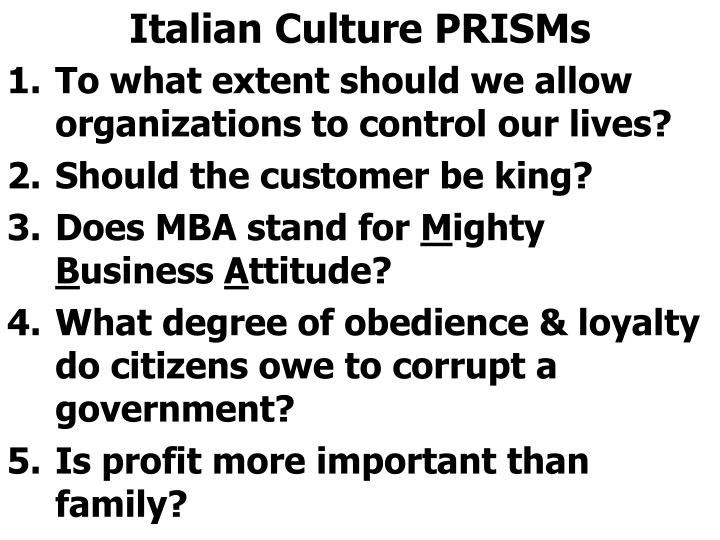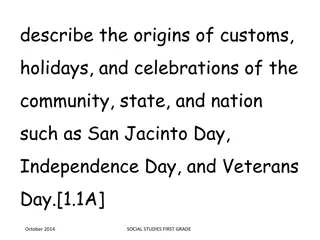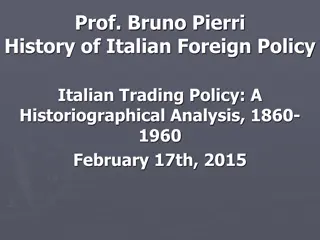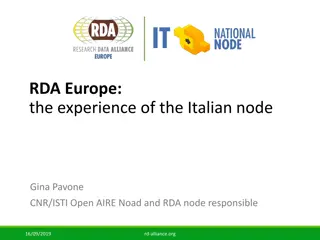Insights into Italian Culture: History, Influential Figures, and Societal Reflections
Explore the rich tapestry of Italian culture through topics such as individualism, historical figures like Michelangelo & Leonardo DaVinci, and themes of power dynamics and ethics. Discover the nuances of Italian society, from the Renaissance to modern-day influences.
Download Presentation

Please find below an Image/Link to download the presentation.
The content on the website is provided AS IS for your information and personal use only. It may not be sold, licensed, or shared on other websites without obtaining consent from the author.If you encounter any issues during the download, it is possible that the publisher has removed the file from their server.
You are allowed to download the files provided on this website for personal or commercial use, subject to the condition that they are used lawfully. All files are the property of their respective owners.
The content on the website is provided AS IS for your information and personal use only. It may not be sold, licensed, or shared on other websites without obtaining consent from the author.
E N D
Presentation Transcript
Italian Culture PRISMs 1. To what extent should we allow organizations to control our lives? 2. Should the customer be king? 3. Does MBA stand for Mighty Business Attitude? 4. What degree of obedience & loyalty do citizens owe to corrupt a government? 5. Is profit more important than family?
Individualism Extended family Community Monochronic Poychronic Low Context High Context Social Ambiguity Social Certainty Low Power Distance High power Distance Mastery Adaptation Emotionally Neutral Emotionally Expressive Quantity of Life Quality of life
Italy is unique as a Latin culture in 2 ways: (1) It has achieved middle class affluence & (2) has a web of institutions
Yesterdays imperialism
Is the Roman Empire making a comeback? (The European Union)
Florence, the Renaissance City
The Enlightenment: The age of science & humanism (man, not the church, is the center of the universe)
Giuseppe Garibaldi Enrico Caruso Christopher Columbus Federico Fellini Sophia Loren Michelangelo Maria Montessori Luciano Pavarotti Giacomo Puccini Raphael Giuseppi Verdi Nicolo Machiavelli Leonardo DaVinci Galileo Galilei Alexandro Volta Guglielmo Marconi Caesar Dante Cicero Giorgio Armani St. Francis of Assisi Andrea Bocelli
Machiavellis classic, The Prince: How to manipulate people in organizations for power & self-gain. Manipulative Machiavellianism is alive & well throughout Italian & Western cultures: POLITICS: negative campaigning; fund raising; spin; lobbying CORPORATIONS: advertising/PR; lobbying; accounting fraud; telemarketing MEDIA: political bias; political campaign advertising; talking heads (ideology struggles).
THE THE
Italians are big ondietrologia (conspiracy theories)
Il politicain si serve (Politicians serve themselves)
Italy is a nation where nepotism, corruption, & dishonesty are incarnate in the political leader. (For example, building & safety codes are seldom enforced in Italy due to collusion between builders & politicians.)
Paralizzato governo The government is so paralyzed that national referendums must be held in order to pass most laws.
CAUSES OF ITALIAN & WESTERN GOVERNMENTAL PARALYSIS 1. Numerous splintered political factions that won t compromise ( Red vs. Blue states in America & Republican-Democratic paralysis) 2. Self-seeking politicians & lobbyists 3. Continuously re-elected incumbents 4. Voter apathy & cynicism
5. Power is based on (elite) people, not institutions 6. The corrupt know each other well 7. Special interest groups know they can court Italian officials 8. Pork barrel political projects ( earmarks in America) 9. Organized corruption (the Mafia) 10. Good-ole-boy justice networks of lawyers, DAs, judges, police
Most Italians liken their country La societ li serve La societ li serve to a whore used, but not loved
1. Italians are strikingly un-private. They argue in public, pour out romantic secrets on television, and talk so loudly and incessantly on their cell telephones that it can be hard not to listen in. 2. The Italian government has cashed in on the cell phone craze to tap the calls of suspected mobsters eavesdropping has become an Italian way of life.
WHY DO ITALIANS BELIEVE IN HANDLING PERSONAL BUSINESS STRICTLY IN CASH? Because Italy is the wealthiest classic Latin culture, Italians stand to lose more to corrupt institutions than Latins in other nations. Italy s underground economy (hidden, non-taxed business income) is enormous.
WHY JUSTICE IS HARD TO COME BY IN ITALY 1. It takes an average of 8 years for Italian courts to finish most major crime trials because they aren t prosecuted on a continuous basis. 2. Lawyers often go on strike. 3. Italy s recently passed statue of limitation for white collar crimes is so short that it is nearly impossible to prosecute white collar criminals before time runs out. A recent Italian government report predicts that 90% of white collar crimes currently under investigation will likely have to be dropped.
ITALIAN ITALIAN
Commercio della famiglia oggi e domani (The family business today & tomorrow)
L' industria italiana di modo (Italian Fashion Industry)
Alla moda italiano il signore (Men s Fashion)
Ugliness or lack of style is a bigger sin in Italy than immorality.
WHY THE FASHION INDUSTRY MAKES SENSE FOR ITALIAN CULTURE 1. Family-owned & run: the ideal form of business in Latin cultures 2. Requires little start-up capital 3. Non-institutional: hard for corrupt government officials to touch 4. Artistic: Being artistic is valued above simply making money
Italian family business owners practice community capitalism (multiple stakeholders): family comes before customers & quality of life before profit maximization. The family is king, not customers.
The customer is not king in Italy the family firm runs things around the needs of the family (hours open, days off, speed of service, etc.)
YOU HAVE TO BE AN INSIDER Want good service? Want to bargain? Want people who treat you in a genuine way? Then you d better be an insider in Latin cultures: a member of the extended family, a long-time loyal customer or supplier, a member of the community, or least a trusted acquaintance of an insider. Latins place relationships ahead of money & top notch performance. They feel that who you do things for is more important than what you do. Working only for the $$$ makes you a professional prostitute.
Italians consider their family business to be a commercial work of art, not just a golden egg to be exploited
STREET-WISE ITALIANO ADVICE: 1. Don t invest your own money in a rented house own your own business 2. Organizations are an abstraction; people are concrete 3. Profit maximization is strictly for those who don t have an extended family 4. Business is artistic self-expression. Don t sell your soul to an impersonal publicly-owned company that cares only about what you produce, not who you are.
NEGATIVE NEGATIVE
Un MBA:Non prabably italiano (This MBA is probably not Italian)
1. Most Italians believe that MBAs care more about their careers than the company they work for they are in it strictly for $$$ & career-building 2. MBAs got no style or sophistication because the only thing they value is profit 3. MBAs don t care what they sell as long as it makes them $$$ 4. MBAs pass nothing on to the next generation except their workaholism
Why devote all of your time, energy, & talents to helping somebody you don t even know (a corporation s stockholders) get rich? Why not give your family members your quality time (on the job with you)?
1. Most Italians & Latins would feel a massive loss of freedom in Anglo- Saxon institutional/organizational culture, with its obsession for control, analysis, punctuality, conformity, & performance, performance, performance. 2. Latins don t want to eat in robot franchises, work for mercenary profit maximizers, cater to rude customers, or separate themselves from family 50-60 hours a week.
THE CORDATA: THE CORDATA:
The cordata at work: A way to turn the scorned corporation into a family network
Semi-independent godfather bosses run their part of the company as if it were a family business. They hire their own employees who work for the godfather exclusively. Strong mutual loyalty is maintained. The various godfathers meet periodically to cut deals between them which shapes how the company operates.























